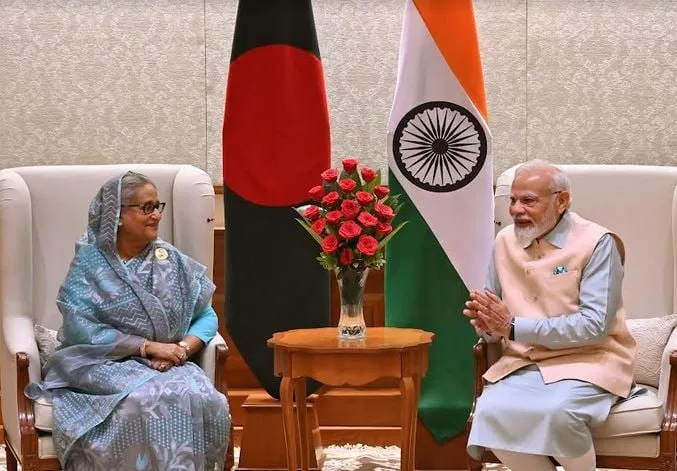 Narendra Modi was sworn in on June 9 for his third consecutive term as India’s prime minister. Public polls had predicted a sweeping majority for Modi, so it came as some surprise that his Bharatiya Janata Party (BJP) lost ground with voters and had to rely on coalition partners to form a ruling government. Although India’s elections were fought mainly on domestic policy issues, there were important exceptions and Modi’s electoral setback could have implications for India’s regional and global policies.
Narendra Modi was sworn in on June 9 for his third consecutive term as India’s prime minister. Public polls had predicted a sweeping majority for Modi, so it came as some surprise that his Bharatiya Janata Party (BJP) lost ground with voters and had to rely on coalition partners to form a ruling government. Although India’s elections were fought mainly on domestic policy issues, there were important exceptions and Modi’s electoral setback could have implications for India’s regional and global policies.
Bangladesh
Kabir and Macdonald: Bangladesh’s government and citizens always watch their closest neighbor’s elections intently. Despite the BJP’s controversial rhetoric and actions toward Muslims in India and the region, over the last 10 years Bangladesh’s Awami League government led by Prime Minister Sheikh Hasina has cultivated a productive working relationship with Modi’s BJP government.
In Modi’s third term, regional geopolitical competition between India and China is likely to raise the stakes of bilateral relations. Last week, Hasina was the first foreign leader to visit Delhi since Modi’s inauguration, indicating the mutual importance of the relationship. The two sides boosted defense ties and cemented a series of agreements to expand cooperation in maritime security, ocean economy, telecommunications and other issues.
Bangladesh will try to maintain its policy of strategic balancing by pursuing independent bilateral ties with India, China and the United States. Despite geopolitical tensions and long-standing policy disagreements, the political understanding between India and Bangladesh will continue: both governments see the other as a key partner and will be reluctant to rock the status quo. With India, Bangladesh will continue to reiterate the need for a cross-border water sharing agreement, removing non-tariff barriers to exports from Bangladesh, and halting border killings. Just back from Delhi, Hasina is set to visit Beijing in two weeks to continue Bangladesh’s balancing act.
Maldives and Sri Lanka
Samaranayake: Prime Minister Modi’s third term was widely expected in Maldives and Sri Lanka. Despite multiple controversies that have characterized Maldives-India relations since the start of Mohamed Muizzu’s new administration in November 2023, the Maldivian president had a successful first official visit to India to attend Modi’s swearing-in ceremony. The previous month, India completed the process of withdrawing military forces in Maldives. The withdrawal was the focal point of Muizzu’s “India Out” campaign when running for president and priority of his first months in office.
Although Maldives agreed to replace Indian military aircraft operators with civilian personnel, the two countries continue to cooperate on a range of issues such as infrastructure development and debt repayment. In a signal that Maldivian-Indian relations have achieved a healthy reset, Muizzu was seated next to Modi at the banquet of visiting leaders after Modi’s ceremony. Observers also noted a positive tone in Muizzu’s interactions with other Indian officials.
Whereas Muizzu is early into a five-year term and his party holds a parliamentary majority after elections in April, Sri Lankan president Ranil Wickremesinghe attended Modi’s ceremony ahead of a presidential election expected to take place in the fall — with uncertainty about the outcome. Indian External Affairs Minister S. Jaishankar visited Sri Lanka afterward in his first bilateral trip of the new term and discussed several areas of cooperation such as energy and maritime security.
Going forward, India and Sri Lanka will need to resolve the issue of Chinese research vessels visiting Sri Lankan ports. Colombo imposed a year-long moratorium on all research vessel visits in January due to Indian and U.S. concerns. Amid confusion in the moratorium’s implementation, the next Sri Lankan administration will undoubtedly face pressure to address the issue. It represents a serious strategic challenge for a smaller state and holds wider implications for the access and basing of major power navies in the Indian Ocean.
Pakistan
Mir: Pakistani leaders anticipated Modi and his BJP to win big in the elections, so they were probably surprised by the final outcome that saw a reduced BJP vote share and coalition rule in New Delhi. However, they don’t expect much to change as a result and believe Modi will continue India’s policy of disengagement with Pakistan and might even strike a more belligerent posture for domestic political gain.
Prior to the elections, Pakistani leaders and elites held some hope that relations with India might improve under a new government, but that sentiment diminished over the course of India’s long campaign season. The Pakistani side, in particular, noted the BJP leadership’s hawkish tone on Pakistan. Pakistani elites focused on the Indian defense minister’s near-admission of assassinating anti-India militants in Pakistan as well as claims by Indian Home Minister Amit Shah and Uttar Pradesh Chief Minister Yogi Adityanath’s about “taking” Pakistan-administered Kashmir and Gilgit Baltistan regions from Pakistan. Perhaps as a result, Pakistani Prime Minister Shehbaz Sharif issued only a weak congratulatory statement to Modi the day after his inauguration, while leaders from many of India’s other neighbors congratulated him earlier and even attended Modi’s inaugural festivities. Sharif seems to have calibrated this statement to maintain diplomatic niceties without excessive warmth.
source : usip
